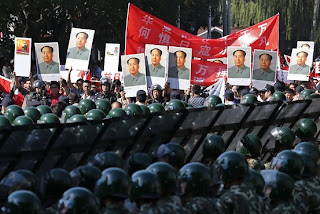Making the rounds lately is a spat between Mitt Romney and President Barack Obama regarding two separate attacks on American consulates in Benghazi, Libya and Cairo, Egypt that both happened this Tuesday, on the 11th anniversary of September 11th. In Libya, four Americans, including Ambassador Chris Stevens, were killed late in the evening after their offices were fired upon with rocket-propelled grenades and assault weapons. In Egypt, there were no casualties, but angry protesters clashed with riot police, burned tires and ultimately climbed the U.S. consulate's walls to tear down the American flag.
 |
| An armed protester stands outside the American consulate in Benghazi, Libya as it burns in flames on 9-11-2012. Photo credit: Reuters |
The causes of the protests and attacks (
as well as others today in Sanaa, Yemen as well as Tunisia) are believed to be in response to a film allegedly made or produced in America which protesters say insults Islam and the Prophet Muhammad, though the assault in Benghazi
appears to have been planned for a while.
Aside from the speculation into the causes, the big news lately is the charges Mitt Romney threw at the Obama Administration immediately following news of the attacks. The soundbite reverberating through the 24-hour-fear-chamber that we call modern media is essentially: Obama apologized to the murderers in Benghazi for offending their religion.
Specifically, after word came that at least one embassy worker was killed in the attack, Romney issued a statement
:
"I'm outraged by the attacks on American diplomatic missions in Libya and
Egypt and by the death of an American consulate worker in Benghazi.
It's disgraceful that the Obama administration's first response was not
to condemn attacks on our diplomatic missions, but to sympathize with
those who waged the attacks."
 |
| Protesters scale the walls of the American embassy in Cairo, Egypt on 9-11-2012. Photo credit: AP |
More simply, Romney's accusation is: "the Obama Administration's first response after the embassy storming in Egypt and murders in Libya was to apologize." So, how accurate is this statement?
1. Let's first and foremost take the crucial step of noticing that the statement Romney calls an "apology" was issued
by the Cairo embassy and not the Libyan embassy. The statement, which i
s now removed from the Cairo embassy website, said:
The Embassy of the United States in Cairo condemns the continuing
efforts by misguided individuals to hurt the religious feelings of
Muslims – as we condemn efforts to offend believers of all religions.
Today, the 11th anniversary of the September 11, 2001, terrorist attacks
on the United States, Americans are honoring our patriots and those who
serve our nation as the fitting response to the enemies of democracy.
Respect for religious beliefs is a cornerstone of American democracy. We
firmly reject the actions by those who abuse the universal right of
free speech to hurt the religious beliefs of others.
This fact is crucial because, again, we're talking about two separate incidents. By lumping both together, Romney makes a more scandalous (and of course more newsworthy) argument that
the Obama Administration apologized to the murderers in Benghazi.
2. Well then, it's true Cairo embassy was still attacked by dangerous radicals, but is it true their statement was technically the Obama Administration's "first" response to being attacked?
According to the NYTimes, the Cairo embassy issued their statement
before the protests in Cairo began to gain steam, as American diplomats had become aware of tensions amongst citizens.
More importantly, after the first confirmed death in Benghazi on Tuesday, Secretary of State Hillary Clinton
issued a statement condemning "in strongest terms the attacks on our mission in Benghazi today"—before Romney's statements were released.
3. Ok, so the Cairo "apology" wasn't the Obama Administration's first response, and it wasn't in reference to murders in Benghazi, but can we at least say the Obama Administration apologized to thin-skinned Muslim radicals in Cairo? All right, sure, this is technically true. I say "technically" because it's true every American embassy around the world ultimately falls under the jurisdiction of the federal government. For example, if I lived and worked in Cairo at the American embassy, and I issued a statement in an attempt to calm down growing anger on behalf of irate ultra-conservative Muslim citizens,
technically you may hold the entire government, including Obama himself, accountable for my post. But the question is—to what degree should we assume the actions of the embassy workers issuing statements are in step with the entire Presidential Administration? Having lived overseas and endured the bureaucracy of European, Asian and North American governments, seeing many cases of one hand not knowing what the other is doing, I'm not so sure.
In the end, what to make of Romney's argument? It wasn't the "first" statement. It reflected the thoughts of the embassy's workers, not the entire Obama Administration.
But most importantly: the protest in Cairo ≠ the murders in Libya.
So let's take a page from Romney and lump things together for sensational point scoring. Because Romney
(intentionally?) confused a statement from the Cairo embassy is the same thing as a statement from the Benghazi embassy, and because he called the statement "disgraceful," then one might say Romney is insulting murdered embassy workers for their own statements?










